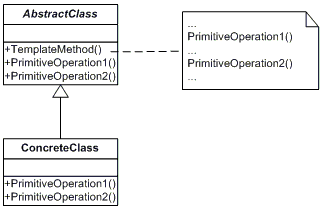Definition
Define the skeleton of an algorithm in an operation, deferring some steps to subclasses. Template Method lets subclasses redefine certain steps of an algorithm without changing the algorithm’s structure.
Explanation
In the template method of this design pattern, one or more algorithm steps can be overridden by subclasses to allow differing behaviors while ensuring that the overarching algorithm is still followed.
In object-oriented programming, first a class is created that provides the basic steps of an algorithm design. These steps are implemented using abstract methods. Later on, subclasses change the abstract methods to implement real actions. Thus the general algorithm is saved in one place but the concrete steps may be changed by the subclasses.
The Template Method pattern thus manages the larger picture of task semantics, and more refined implementation details of selection and sequence of methods. This larger picture calls abstract and non-abstract methods for the task at hand. The non-abstract methods are completely controlled by the template method, but the abstract methods, implemented in subclasses, provide the pattern’s expressive power and degree of freedom. Template Method’s abstract class may also define hook methods that may be overridden by subclasses. Some or all of the abstract methods can be specialized in a subclass, allowing the writer of the subclass to provide particular behavior with minimal modifications to the larger semantics. The template method (that is non-abstract) remains unchanged in this pattern, ensuring that the subordinate non-abstract methods and abstract methods are called in the originally intended sequence.
Screencast
TypeScript Code
module TemplateMethod {
class ItemMigrator {
protected GetItems(): void {
throw new Error("Not implemented!");
}
protected ChangeItems(): boolean {
throw new Error("Not implemented!");
}
protected SaveItems(): void {
throw new Error("Not implemented!");
}
public UpdateItems(): void {
this.GetItems();
if (this.ChangeItems()) {
this.SaveItems();
} else {
Output.WriteLine("Nothing has changed. Not calling SaveItems()");
}
}
}
class Person {
public firstName: string;
public lastName: string;
}
class PersonMigrator extends ItemMigrator {
constructor() {
super();
}
protected GetItems(): void {
Output.WriteLine("Getting persons.");
}
protected ChangeItems(): boolean {
Output.WriteLine("Changing persons.");
return true;
}
protected SaveItems(): void {
Output.WriteLine("Saving persons.");
}
}
class Addres {
public street: string;
public zipcode: string;
}
class AddresMigrator extends ItemMigrator {
constructor() {
super();
}
protected GetItems(): void {
Output.WriteLine("Getting addresses.");
}
protected ChangeItems(): boolean {
Output.WriteLine("Not changing addresses.");
return false;
}
protected SaveItems(): void {
Output.WriteLine("Saving addresses.");
}
}
window.addEventListener("load", function () {
var migrators = new Array<ItemMigrator>(new PersonMigrator(), new AddresMigrator());
migrators.forEach((migrator) => {
migrator.UpdateItems();
});
});
}
Output
